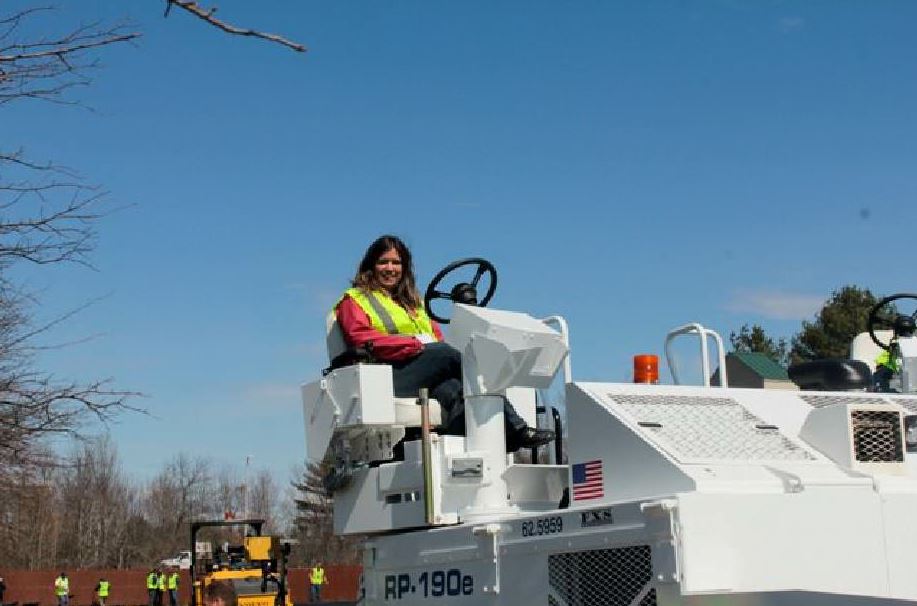Meet the State Exec: MAPA’s Tanya Bentley
BY AsphaltPro Staff

Maine Asphalt Pavement Association, Augusta, Maine, was founded in 2001. Now, the association boasts 14 producer members accounting for 100 percent of the asphalt tonnage let to contract in Maine.
MAPA has been led by Executive Director Tanya Bentley for the past six years. AsphaltPro spent some time getting to know Bentley and learning about how MAPA is working to promote the asphalt industry in the state.
What are the top two or three ways you have increased membership in the association?
We’ve increased membership in a number of ways, including seminars, networking, meetings, Facebook and advertising.
What is your favorite method for recruiting new asphalt professionals to the industry in general?
I enjoy getting potential new members to register to attend our Spring Paving Seminar. New members receive two complimentary passes to the show.
In what month do you hold your annual meeting?

MAPA’s Spring Paving Seminar also includes the largest equipment show in New England, according to Bentley.
In April, we have our Spring Paving Seminar, and we hold our Annual Membership Meeting in November. We also host the largest equipment show in New England at our Spring Paving Seminar, which brings in more than 70 vendors and 350 guests from the industry.
This equipment trade show and educational seminar combination under one roof continues to set the standard for paving throughout all of New England. Educational events from our 2018 seminar include motivational safety speaker Eric Giguere, who provided the group with a stark and sobering story about a workplace accident that changed his life forever, and a workshop on the latest paver, trucking and rolling technologies with Steve Forsley from E.D. Etnyre & Co. and Laikram Narsingh and Dave Reposa from Wirtgen America.

At its annual Spring Paving Seminar, MAPA hands out a number of awards.
We also give out awards during our Spring Paving Seminar, including an Industry Professional of the Year award, which recognized Gene Alley of Pike Industries this year, and Lifetime Achievement Awards, which recognized Rollan Walker of the Maine Department of Transportation and Herrick Randall of Pike Industries this year.
About how many member asphalt projects do you visit per year? How many member asphalt plant tours? Member asphalt open house events? State agency and DOT meetings?
Each year, I attend between 10 and 12 asphalt projects, three or four asphalt plant tours, and more than 10 DOT meetings. We don’t do asphalt open houses.
On a scale of 1 to 5 (1 being none at all; 5 being very much), how much of a threat to your members’ marketshare/livelihood is the concrete industry in your state?
I would say it’s a one (none at all). The concrete industry has not made an investment in promoting new options such as roller compacted concrete to compete with the asphalt industry, likely due to the fact that most of the applicators are very small residential and light commercial contractors.
On a scale of 1 to 5 (1 being none at all; 5 being very much), how much difficulty are your members having in finding qualified workers for their asphalt paving or production crews?
I would rate it a five. Finding qualified workers in our asphalt paving industry is particularly more difficult than most traditional blue-collar workforce jobs. It’s become more clear in the recent past that the amount of experienced, skilled workers in our industry has dramatically reduced. In the northeast, there are several factors contributing to this dilemma. We face a number of seasonal challenges, working primarily between April and October. We then lay off the majority of employees during the winter months. In the past, there were people applying who had mechanical and operational skills to perform the work needed, but that is not the case anymore. On rare occasions, we do have someone apply with the needed skills but that is the exception. The younger generation’s work ethic in regards to dealing with long hours, working nights, working in hot conditions or doing manual labor does not mesh.

The Spring Paving Seminar also offers a number of educational opportunities.
To solve these problems, training is the name of the game. Accolades need to be constant. Millennials (Gen Y) need constant reassurance that their efforts “mean” something. It takes time and it’s often disappointing, as some do not remain or return season after season, but there are good workers out there and we can develop them.
To mitigate some of this, most members have been willing to invest more time and money into training. Bringing extra people on to job shadow, etc. Members have also found that rewarding performers is one way to keep employees long term. They also provide options once they are vested, such as cross training or moving to different departments. Some members have done “just-in-time” job fairs with on the spot job offers.
On a scale of 1 to 5 (1 being none at all; 5 being very much), how involved are your asphalt members in transportation issues such as funding and infrastructure improvements?
I would rate it a five. MAPA has close ties with another state association, the Maine Better Transportation Association. They are advocates for the funding of a multimodal transportation system – air, roads, rail, port, transit, bicycle and pedestrian facilities – to serve communities and citizens throughout the state.
Get to Know Tanya Bentley

MAPA has one part-time executive director.
What do you see as the most important part of your job as an executive director of a SAPA?
The most important part of my job as an executive director is communication between industry and agency, and helping businesses network and create relationships.
What do you find most enjoyable about your job as an executive director of a SAPA?
The most enjoyable thing about my job is meeting and networking with local businesses, small and large, throughout the state of Maine.
What has been the most rewarding experience for you during your time as the executive director?
Learning about the industry and meeting all the folks who work hard to make Maine a smooth state to drive in!
